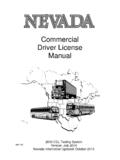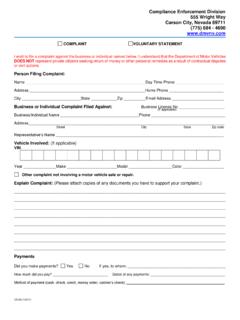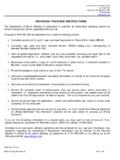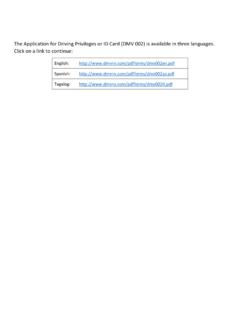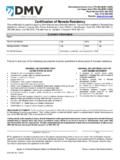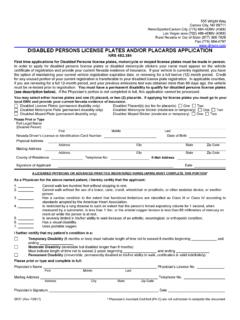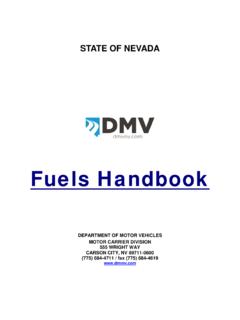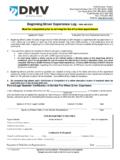Transcription of Nevada DMV Hazardous Materials Handbook - dmvnv.com
1 COMMERCIAL DRIVER S LICENSE Hazardous Materials Handbook State of Nevada Department of Motor Vehicles January 2012 Table of Contents The Intent of the Regulations 6 Hazardous Materials Transportation--Who Does What 6 Communication Rules 7 Loading and Unloading 14 bulk Packaging Marking, Loading and Unloading 16 Hazardous Materials --Driving and Parking Rules 17 Hazardous Materials Emergencies 19 Table A Radioactive Separation Table 22 Table B Table of Hazardous Class Definitions 22 Hazardous Materials Glossary 23 This page left intentionally blank.
2 Hazardous Materials Handbook Page 5 Hazardous Materials This Section Covers The Intent of the Regulations bulk Tank Loading, Unloading, and Marking Driver Responsibilities Driving and Parking Rules Communications Rules Emergencies Loading and Unloading Hazardous Materials are products that pose a risk to health, safety, and property during transportation. The term often is shortened to HAZMAT, which you may see on road signs, or to HM in government regulations. Hazardous Materials include explosives, various types of gas, solids, flammable and combustible liquid, and other Materials . Because of the risks involved and the potential consequences these risks impose, all levels of government regulate the handling of Hazardous Materials .
3 The Hazardous Materials Regulations (HMR) is found in parts 100 - 185 of title 49 of the Code of Federal Regulations. The common reference for these regulations is 49 CFR 100 - 185 The Hazardous Materials Table in the regulations contains a list of these items. However, this list is not all-inclusive. Whether or not a material is considered Hazardous is based on its characteristics and the shipper's decision on whether or not the material meets a definition of a Hazardous material in the regulations. The regulations require vehicles transporting certain types or quantities of Hazardous Materials to display diamond-shaped, square on point, warning signs called placards. This section is designed to assist you in understanding your role and responsibilities in hauling Hazardous Materials .
4 Due to the constantly changing nature of government regulations, it is impossible to guarantee absolute accuracy of the Materials in this section. An up-to-date copy of the complete regulations is essential for you to have. Included in these regulations is a complete glossary of terms. You must have a commercial driver license (CDL) with a Hazardous Materials endorsement before you drive any size vehicle that is used to transport Hazardous material as defined in 49 CFR You must pass a written test about the regulations and requirements to get this endorsement. Everything you need to know to pass the written test is in this section. However, this is only a beginning. Most drivers need to know much more on the job. You can learn more by reading and understanding the federal and state rules applicable to Hazardous Materials , as well as, attending Hazardous Materials training courses.
5 Your employer, colleges and universities, and various associations usually offer these courses. You can get copies of the Federal Regulations (49 CFR) through your local Government Printing Office bookstore and various industry publishers. Union or company offices often have copies of the rules for driver use. Find out where you can get your own copy to use on the job. The regulations require training and testing for all drivers involved in transporting Hazardous Materials . Your employer or a designated representative is required to provide this training and testing. Hazardous Materials employers are required to keep a record of training for each employee as long as that employee is working with Hazardous Materials , and for 90 days thereafter.
6 The regulations require that Hazardous Materials employees be trained and tested at least once every three years. All drivers must be trained in the security risks of Hazardous Materials transportation. This training must include how to recognize and respond to possible security threats. The regulations also require that drivers have special training before driving a vehicle transporting certain flammable gas Materials or highway route controlled quantities of radioactive Materials . In addition, drivers transporting cargo tanks and portable tanks must receive specialized training. Each driver s employer or his or her designated representative must provide such training. Hazardous Materials Handbook Page 6 Some locations require permits to transport certain explosives or bulk Hazardous wastes.
7 States and counties also may require drivers to follow special Hazardous Materials routes. The federal government may require permits or exemptions for special Hazardous Materials cargo such as rocket fuel. Find out about permits, exemptions, and special routes for the places you drive. The Intent of the Regulations Contain the material Transporting Hazardous Materials can be risky. The regulations are intended to protect you, those around you, and the environment. They tell shippers how to package the Materials safely and drivers how to load, transport, and unload the material . These are called "containment rules." Communicate the Risk To communicate the risk, shippers must warn drivers and others about the material 's hazards.
8 The regulations require shippers to put hazard warning labels on packages, provide proper shipping papers, emergency response information, and placards. These steps communicate the hazard to the shipper, the carrier, and the driver. Assure Safe Drivers and Equipment In order to get a Hazardous Materials endorsement on a CDL, you must pass a written test about transporting Hazardous Materials . To pass the test, you must know how to: Identify what are Hazardous Materials . Safely load shipments. Properly placard your vehicle in accordance with the rules. Safely transport shipments. Learn the rules and follow them. Following the rules reduces the risk of injury from Hazardous Materials . Taking shortcuts by breaking rules is unsafe. Non-compliance with regulations can result in fines and jail.
9 Inspect your vehicle before and during each trip. Law enforcement officers may stop and inspect your vehicle. When stopped, they may check your shipping papers, vehicle placards, and the Hazardous Materials endorsement on your driver license, and your knowledge of Hazardous Materials . Hazardous Materials Transportation Who Does What The Shipper Sends products from one place to another by truck, rail, vessel, or airplane. Uses the Hazardous Materials regulations to determine the product s: Proper shipping name. Hazard class. Identification number. Packing group. Correct packaging. Correct label and markings. Correct placards. Must package, mark, and label the Materials ; prepare shipping papers; provide emergency response information; and supply placards.
10 Certify on the shipping paper that the shipment has been prepared according to the rules (unless you are pulling cargo tanks supplied by you or your employer). The Carrier Takes the shipment from the shipper to its destination. Prior to transportation, checks that the shipper correctly described, marked, labeled, and otherwise prepared the shipment for transportation. Refuses improper shipments. Reports accidents and incidents involving Hazardous Materials to the proper government agency. The Driver Makes sure the shipper has identified, marked, and labeled the Hazardous Materials properly. Refuses leaking packages and shipments. Placards vehicle when loading, if required. Safely transports the shipment without delay. Follows all special rules about transporting Hazardous Materials . Keeps Hazardous Materials shipping papers and emergency response information in the proper place.
